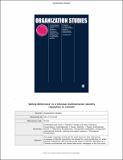Files in this item
‘Eating bitterness’ in a Chinese multinational : identity regulation in context
Item metadata
| dc.contributor.author | Lai, Keyan | |
| dc.contributor.author | Morgan, Glenn | |
| dc.contributor.author | Morris , Jonathan | |
| dc.date.accessioned | 2019-03-28T16:30:03Z | |
| dc.date.available | 2019-03-28T16:30:03Z | |
| dc.date.issued | 2019-03-28 | |
| dc.identifier | 257396525 | |
| dc.identifier | 8cb1568c-bcb6-4240-915a-caee8ef2a836 | |
| dc.identifier | 85063584270 | |
| dc.identifier | 000532406600004 | |
| dc.identifier.citation | Lai , K , Morgan , G & Morris , J 2019 , ' ‘Eating bitterness’ in a Chinese multinational : identity regulation in context ' , Organization Studies , vol. OnlineFirst . https://doi.org/10.1177/0170840619835271 | en |
| dc.identifier.issn | 0170-8406 | |
| dc.identifier.uri | https://hdl.handle.net/10023/17396 | |
| dc.description.abstract | This paper responds to the call for more focus on how micro level processes of identity regulation are shaped by, and constitutive of, wider societal institutions. We provide a case study of identity regulation in a Chinese multinational and show how senior managers in the firm draw on distinctive national and organizational contexts in China to construct, reinforce and reproduce a particular set of identities for employees. These identities draw upon discourses in the wider Chinese context which reflect the struggle of China to become a major industrial power after a century of humiliation by the West and the need for employees to provide this extra effort in the face of the existential challenges faced by the company and by the country. We demonstrate how managers create specific HR mechanisms that intertwine these discourses with the identities of employees and with the identity of the organization. This paper contributes to a better understanding of how micro-processes of identity work and mid-level processes of identity regulation and firm strategy are linked to macro-level institutional structures. Based on the framework provided, the paper discusses how far similar identity regulation mechanisms could be adopted elsewhere where similar macro-level discourses might be available, firstly in other Chinese MNCs, secondly in other East Asian countries such as South Korea, thirdly, more widely in emergent economies where MNCs are embedded in state driven forms of capitalism, and finally in developed economies where populist nationalism is becoming increasingly influential. In this way, studies of identity regulation can bring organization studies into greater dialogue with other social sciences concerned with wider institutional change and continuity. | |
| dc.format.extent | 325666 | |
| dc.language.iso | eng | |
| dc.relation.ispartof | Organization Studies | en |
| dc.subject | Identity regulation | en |
| dc.subject | Organizational identity | en |
| dc.subject | Discourse | en |
| dc.subject | Chinese multinationals | en |
| dc.subject | Ethnography | en |
| dc.subject | HD28 Management. Industrial Management | en |
| dc.subject | NDAS | en |
| dc.subject.lcc | HD28 | en |
| dc.title | ‘Eating bitterness’ in a Chinese multinational : identity regulation in context | en |
| dc.type | Journal article | en |
| dc.contributor.institution | University of St Andrews. School of Management | en |
| dc.identifier.doi | 10.1177/0170840619835271 | |
| dc.description.status | Peer reviewed | en |
| dc.date.embargoedUntil | 2019-03-28 |
This item appears in the following Collection(s)
Items in the St Andrews Research Repository are protected by copyright, with all rights reserved, unless otherwise indicated.

